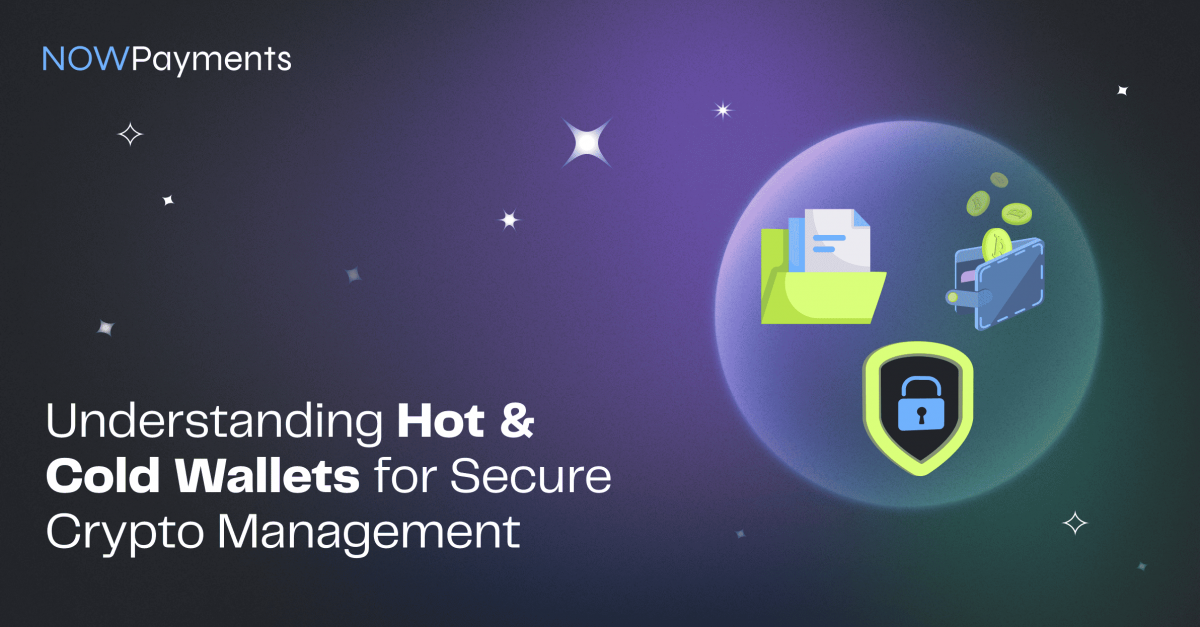Understanding crypto wallets is crucial for anyone venturing into the world of cryptocurrency. There are various types of wallets, each serving different purposes. A hardware wallet is a hardware device designed to store your private keys offline, providing enhanced security. In contrast, a software wallet can connect to the internet, allowing for easier crypto transactions, but it may be more vulnerable to hacks. The difference between the two lies primarily in their security. For instance, cold wallets offer offline storage and are generally considered more secure than hot wallets, which are always connected to the internet.
For businesses that require a reliable crypto payment gateway, NOWPayments can integrate seamlessly with your preferred wallet type, whether hot or cold. By using NOWPayments, you can ensure secure and efficient transactions, making it an excellent solution for businesses operating in the cryptocurrency space.
Hot Wallets Explained
Hot wallets are cryptocurrency wallets that remain online, providing easy access to your funds. In contrast, cold wallets store crypto offline, enhancing security of a cold wallet. Hot vs cold wallets serve different purposes; cold wallets are ideal for long-term storage, while hot wallets come with the convenience of quick transactions.
Businesses using hot wallets to handle frequent transactions can leverage NOWPayments for seamless payment processing. With its easy-to-use API, NOWPayments integrates perfectly with hot wallets, ensuring a smooth payment experience for both businesses and customers.
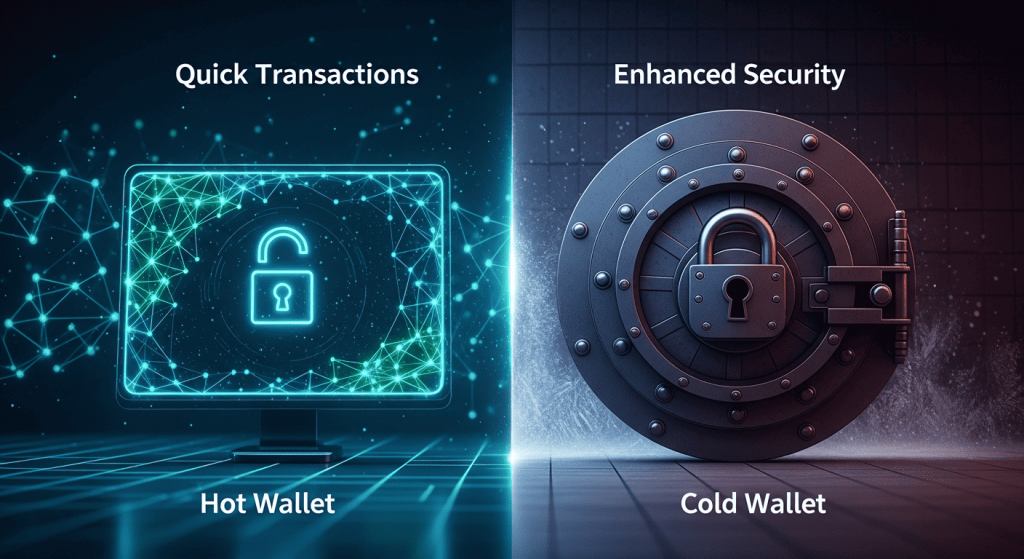
How Hot Wallets Work
Hot wallets are software-based solutions that enable users to manage their crypto assets online. Unlike cold wallets, which are hardware wallets or offline wallets, hot wallets are always connected to the internet. This feature allows for quick access and transactions, but comes with increased security risks.
A wallet may be a crypto hot wallet or a hardware wallet, depending on user needs. While hot wallets facilitate easy trading, cold wallets offer superior security, making them ideal for long-term storage. If a wallet is lost or damaged, recovery can be more complicated with cold wallets.
Cold Wallets Explained
Cold wallets are hardware wallets that provide a secure way to store crypto offline, distinguishing them from hot wallets that connect to the internet. The main difference lies in security; while hot wallets are software based and more vulnerable, cold wallets protect your assets.
For organizations managing significant funds or long-term crypto holdings, NOWPayments ensures compatibility with cold wallets, providing an added layer of security when processing payments. This makes it an ideal choice for businesses prioritizing asset safety.
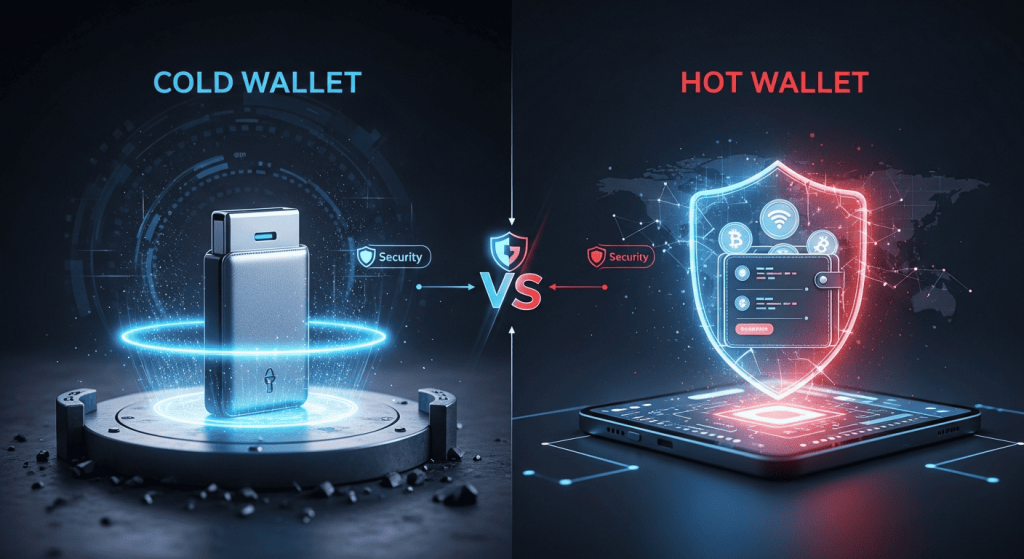
How Cold Wallets Work
Cold wallets are a secure way to store your crypto coins offline, which makes them less vulnerable to hacks. Unlike hot wallets, which are connected to the internet, cold wallets are not accessible online, providing enhanced security. This wallet usage depends on the need for safety over convenience.
When you store your wallet using cold wallets, you significantly lower the risk of online threats. The wallet provider may offer various wallet options, including metal wallets that can withstand physical damage. With these two wallet types, understanding what’s the difference is crucial for effective crypto management.
In summary, using cold wallets is a way to make a wallet very difficult to access without the proper offline methods. This approach ensures that your wallet is a crypto asset that is only accessible when you choose, adding a layer of protection against potential cyber threats.
Key Differences Between Hot And Cold Wallets
When comparing hot wallet vs cold crypto storage, the main distinction lies in accessibility. Hot wallets allow immediate access, while cold wallets prioritize offline storage for enhanced security.
Whether you manage a hot or cold wallet, NOWPayments supports both options, giving businesses the flexibility to choose the wallet type that best suits their needs. Its reliable infrastructure ensures that no matter the wallet, payments are processed quickly and securely.
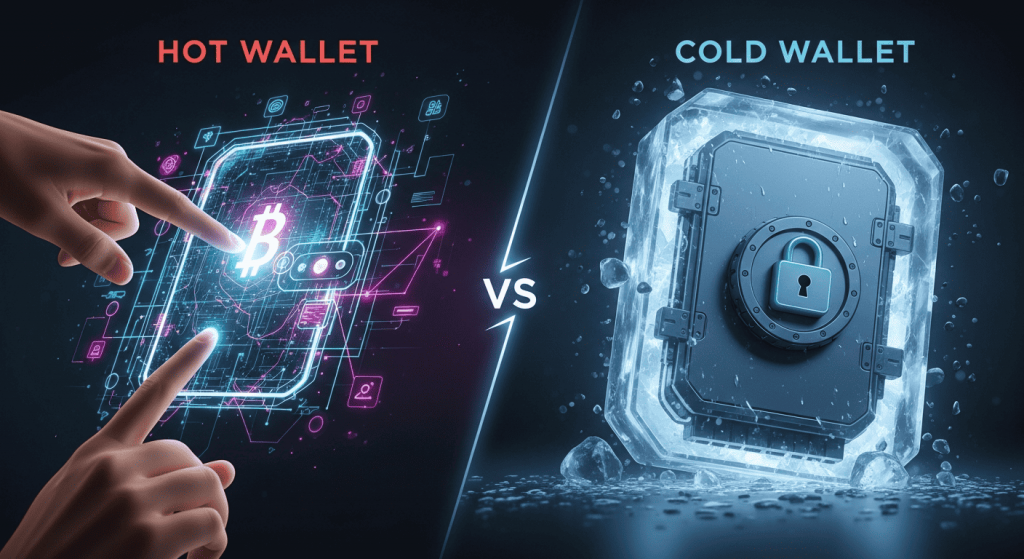
Accessibility And Convenience
Hot wallets excel in accessibility, providing instant access to your funds, making them ideal for frequent transactions or daily crypto payments. They are often available as mobile apps or browser extensions, ensuring you can manage your assets on the go. On the other hand, cold wallets prioritize security over convenience, requiring additional steps to access funds due to their offline nature. This makes them better suited for long-term storage rather than regular transactions.
Security Features
Cold wallets offer superior security features, as they are not connected to the internet, significantly reducing the risk of hacking and cyberattacks. Devices like hardware wallets store private keys offline, ensuring maximum protection for your assets. Conversely, hot wallets, while convenient, are more exposed to online threats. However, many modern hot wallets include advanced encryption, two-factor authentication, and backup features to enhance security for users who require frequent access to their funds.
Cost Considerations
Cost is another key factor when deciding between hot and cold wallets. Hot wallets are often free to use, as they are typically software-based applications. Cold wallets, however, involve an upfront cost, especially for hardware wallets, which can range from $50 to $200 or more depending on the brand and features. While cold wallets may require an initial investment, their added security can be worth it for those storing large amounts of cryptocurrency. On the other hand, hot wallets are a cost-effective solution for users who prioritize accessibility and frequent transactions over ultimate security.
Pros And Cons Of Hot And Cold Wallets
Hot wallet vs cold crypto wallets primarily differ in connectivity. While hot and cold crypto wallets serve the same purpose, cold wallets come with enhanced security as they are not connected to the internet. This makes them ideal for long-term storage.
Cold wallets differ from hot wallets in terms of access. A cold wallet requires offline storage, such as a hardware wallet or paper wallet. A paper wallet is simply a printed QR code, while hardware wallets are physical devices that allow secure access to your wallet.
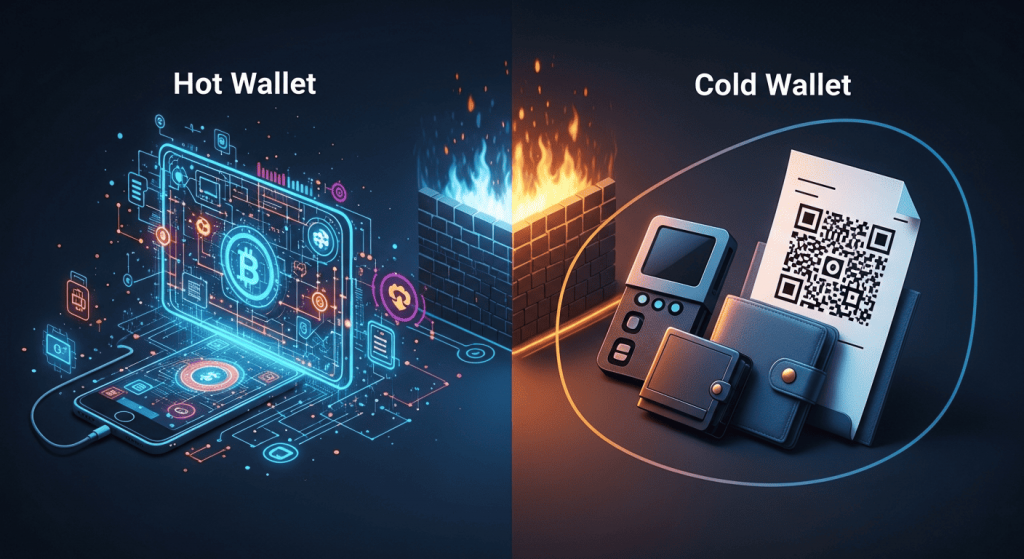
Advantages Of Hot Wallets
1. Instant Accessibility: Hot wallets provide immediate access to your funds, making them ideal for frequent transactions and day-to-day crypto usage.
2. User-Friendly: Most hot wallets come with intuitive interfaces, making them suitable for beginners in the crypto space.
3. Convenience: Hot wallets allow you to send and receive cryptocurrencies at any time, as they are always connected to the internet.
4. Integration: Many hot wallets can be linked to crypto exchanges for seamless trading.
5. Free or Low-Cost Options: Most hot wallets are free to use, with optional premium features available.
Disadvantages Of Hot Wallets
1. Increased Security Risks: Since hot wallets are connected to the internet, they are more vulnerable to hacking, phishing attacks, and malware. This connectivity increases the likelihood of unauthorized access to your funds.
2. Risk of Device Loss or Damage: If your hot wallet is installed on a mobile device or computer and that device is lost, stolen, or damaged, you may lose access to your wallet unless you have proper backups in place.
3. Dependent on Internet Connectivity: Hot wallets require a stable internet connection to function, which can be inconvenient in areas with limited or unreliable access to the internet.
4. Lower Suitability for Large Funds: Due to their online exposure, hot wallets are not ideal for storing large amounts of cryptocurrency. Keeping significant assets in a hot wallet poses a higher risk of loss compared to cold storage.
5. Potential for Human Error: Users might accidentally expose private keys or download malicious apps posing as wallets, leading to the loss of funds. This makes hot wallets less forgiving for inexperienced users.

Advantages Of Cold Wallets
1. Enhanced Security: Cold wallets store private keys offline, significantly reducing the risk of online attacks. When paired with NOWPayments, businesses can process payments securely while protecting funds.
2. Ideal for Long-Term Storage: Designed for holding large amounts of crypto, cold wallets are a great solution for organizations using NOWPayments for occasional high-value transactions.
3. Protection Against Device Compromise: Since cold wallets do not rely on internet connectivity, they are not affected by breaches, hacks, or network vulnerabilities associated with online platforms.
4. Physical Control Over Assets: Cold wallets ensure users retain full ownership of their funds. NOWPayments complements this by offering features like customizable payout solutions tailored to businesses.
5. Resilience Against Data Loss: With proper backups, cold wallets ensure funds are recoverable even if the primary wallet is lost, damaged, or destroyed.
Disadvantages Of Cold Wallets
1. Less Convenient for Daily Transactions: Cold wallets are not connected to the internet, making them less practical for frequent transactions or quick access to funds.
2. Higher Setup Complexity: Setting up a cold wallet, such as a hardware wallet or paper wallet, can be more complicated for beginners compared to hot wallets.
3. Risk of Physical Loss or Damage: Cold wallets are physical devices or materials (like USB drives or paper), which means they can be lost, stolen, or damaged without a chance for recovery if not backed up.
4. Limited Accessibility: Accessing funds stored in a cold wallet often requires additional steps, like connecting a hardware wallet to a computer, which can be time-consuming in urgent situations.
5. Higher Initial Costs: Hardware wallets typically come with a purchase price, making them more expensive than free hot wallet options for new users or those with smaller crypto holdings.
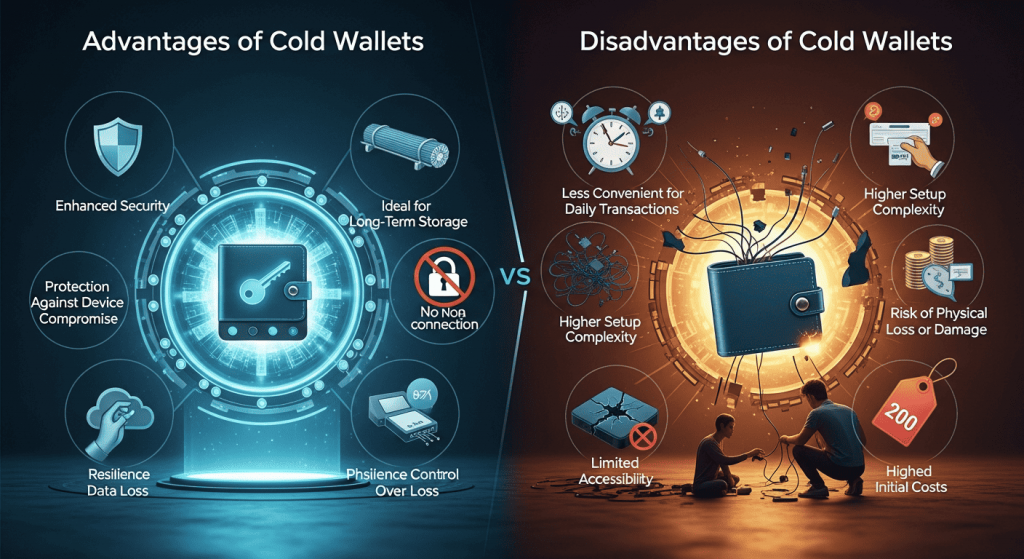
Conclusion
Whether you opt for a hot wallet for convenience or a cold wallet for security, both serve vital purposes in managing cryptocurrency. For businesses, choosing the right wallet type can enhance operations, especially when integrated with NOWPayments. As a leading crypto payment gateway, NOWPayments supports both wallet types, offering secure, seamless payment processing to suit your needs. No matter your choice, NOWPayments ensures that your crypto transactions remain efficient, reliable, and safe.

